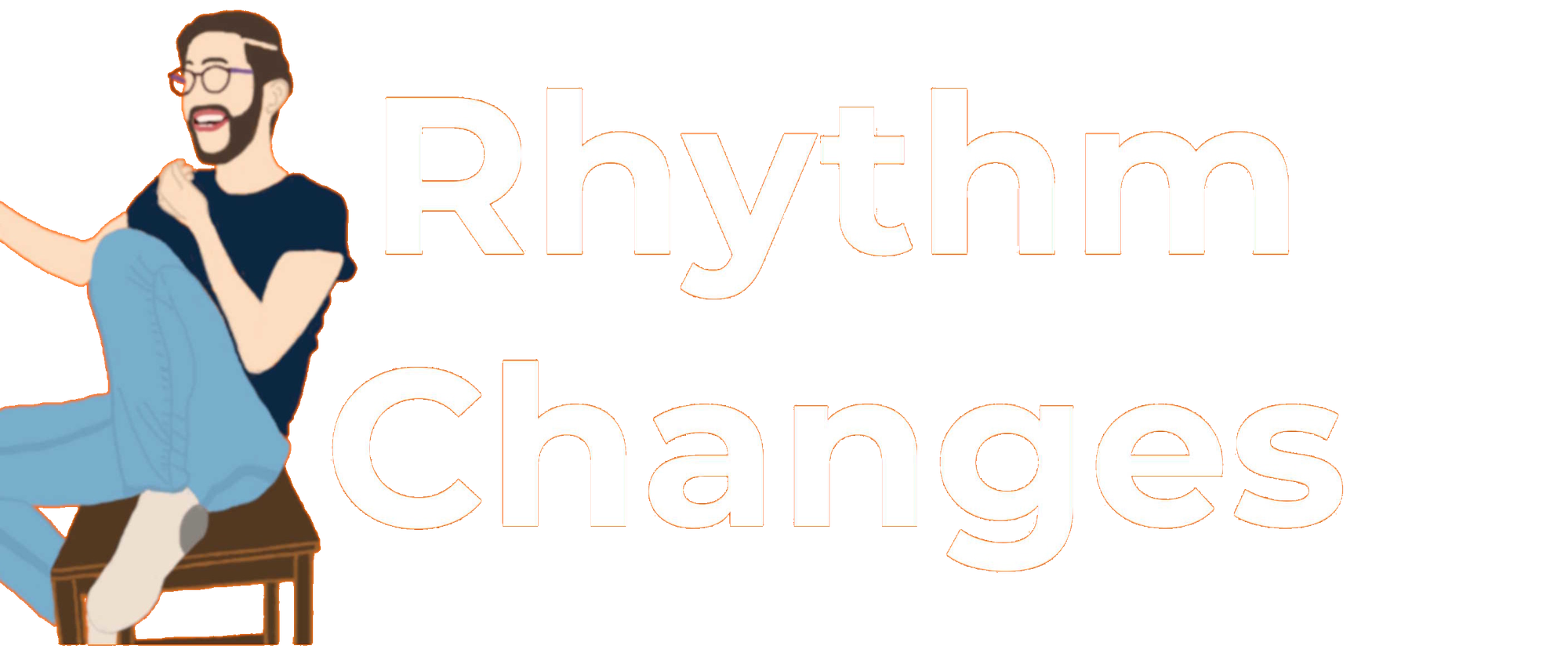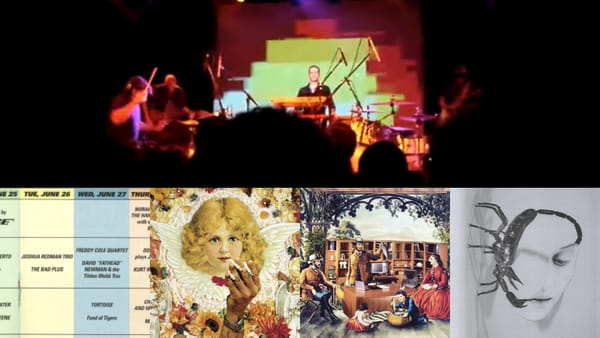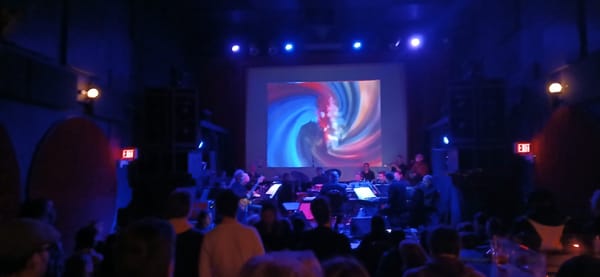Caity Gyorgy interview: Asking for Trouble & With Strings
One album came out in April, featuring Frank Loesser songs; and a different, much more massive project is on the way
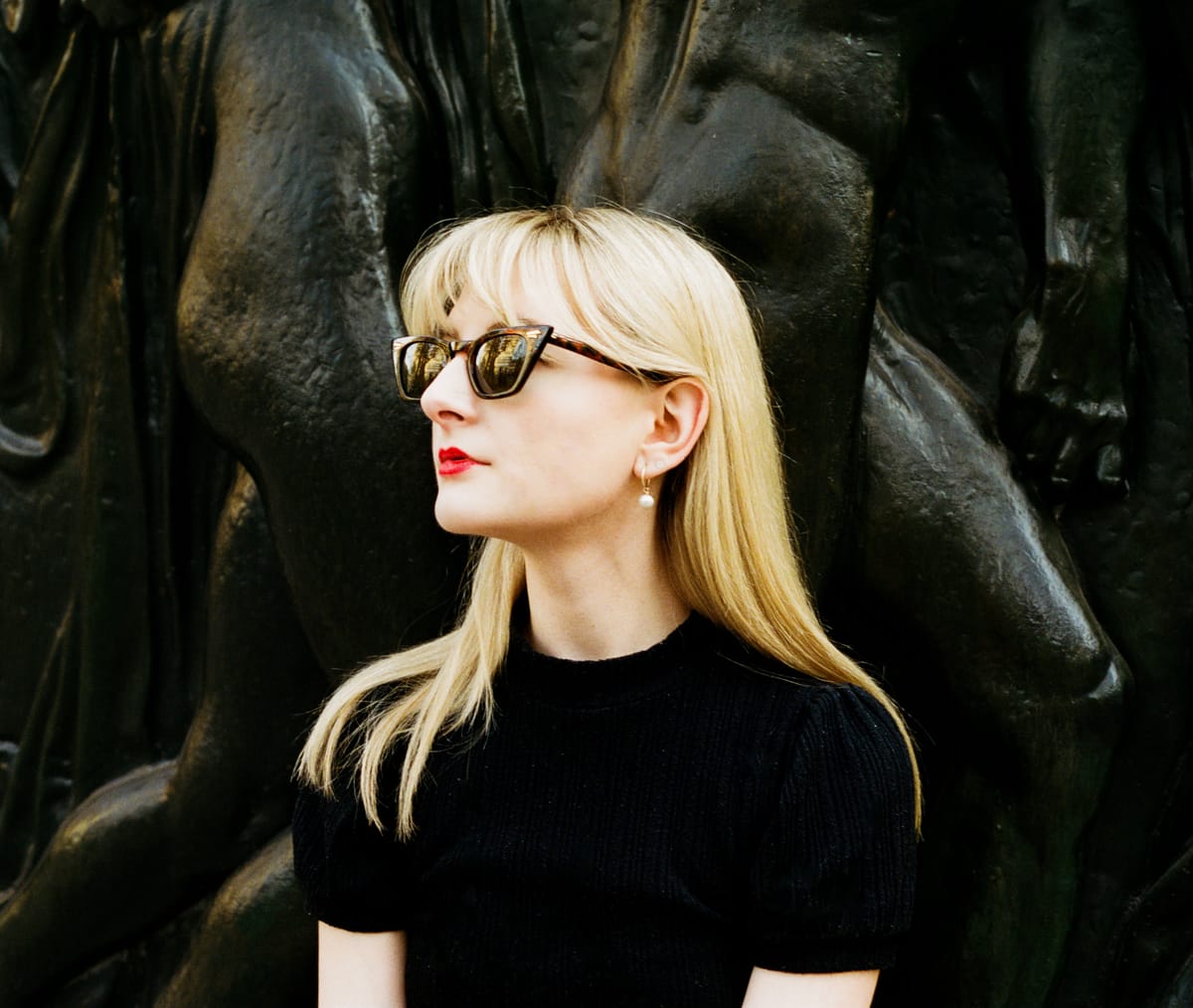
This spring, Caity Gyorgy landed in two extremely different places at once. On one hand, she won her third Juno Award and dropped a streaming-only release in the most casual fashion. Asking for Trouble, her second duo album with pianist Mark Limacher, was announced just two weeks before it came out in mid-April. The album features her and Limacher playing 11 songs written by Frank Loesser; she did the cover art and photos herself.
On the other hand, Gyorgy is deep into the most demanding project of her career, both financially and time-wise. On Asking for Trouble's release day, she and Limacher posted from the studio, where they were mixing a new album featuring orchestral accompaniment. The two co-wrote all the songs, Limacher arranged them for orchestra, and they recorded at the National Music Centre in Gyorgy's native Calgary.
No, her label La Reserve Records isn't necessarily paying for all of that up-front: she is. Of course she wrote grants to cover as much of it as possible, but she didn't hesitate to seize what feels like the creative opportunity of a lifetime. The first single, "That Doesn't Matter", came out on the May long weekend, while August 22 is the full album release date for Caity Gyorgy with Strings.
It was great timing, then, that Gyorgy joined me on April 29th for our first interview together. You'll find her thoughtful, ready to have fun but willing to share vulnerabilities and details – just like her songs. Please enjoy my conversation with Caity Gyorgy below. I made some transcript editing for clarity.
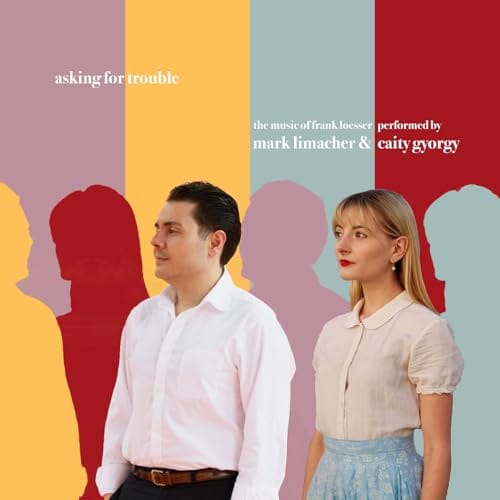
Asking for Trouble, released April 11, 2025 | Streaming
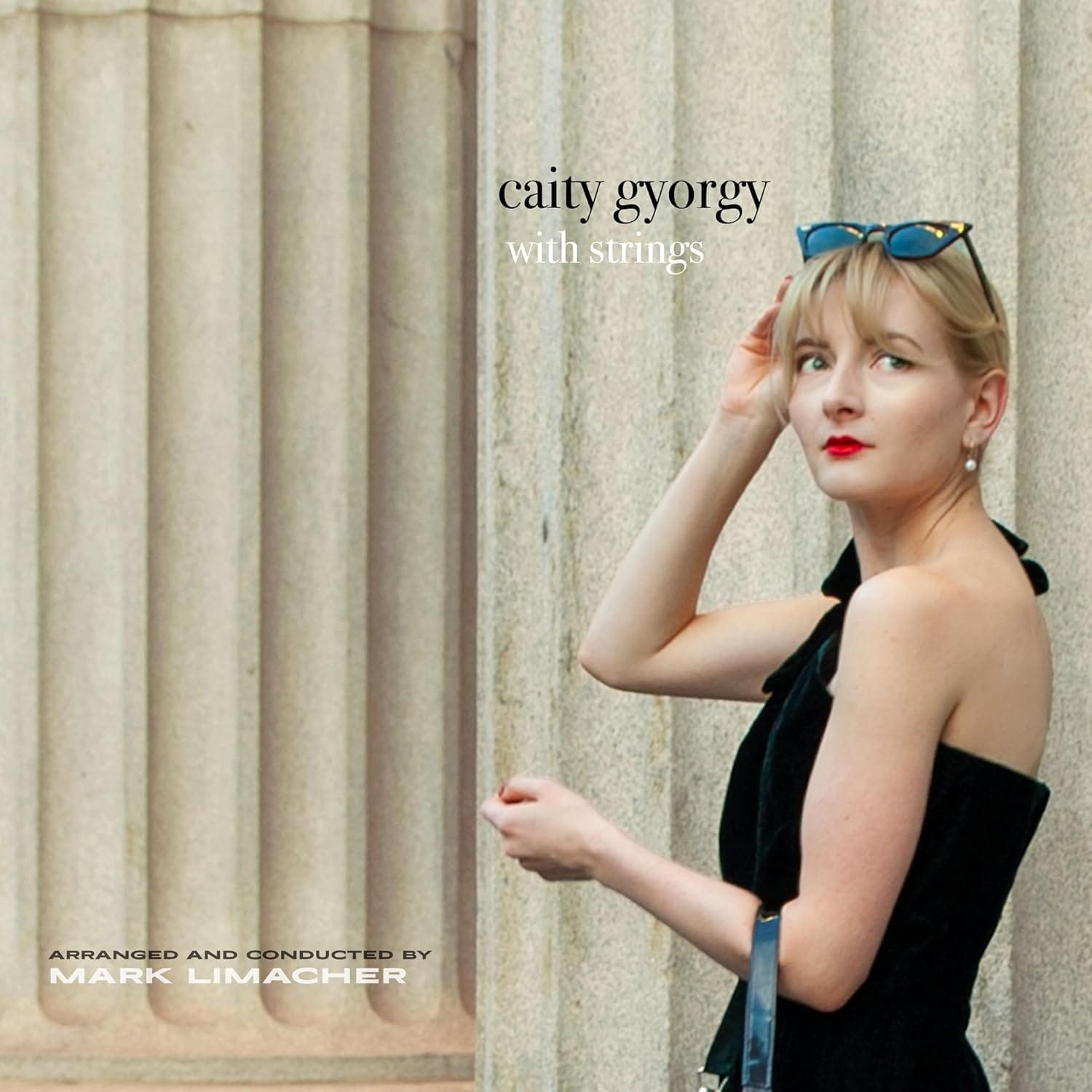
Caity Gyorgy with Strings, released August 22, 2025 | Streaming
WILL CHERNOFF: Alright, Caity, I would be remiss if I didn’t start here. You’re already onto the next thing, which we’ll talk about, but I have to ask this, otherwise I’d be messing up if I didn’t ask it. Hello! How Are You?
CAITY GYORGY: Hi! [Laughs.] Ooh, that’s good. I do that all the time. I started writing that in thank-you notes when I send out CDs if people order that one. I’m good, how are you?
WC: Now, I know you've been a lot of places, even just in the past month. I mean, you can talk about what it was like in Vancouver for the Junos, and the win, if you want to. Congrats!
CG: Thank you so much!
WC: I was just curious what you would want to share in general about your relationship with Vancouver off the top, because it's been a few years where you have had a pretty significant relationship with Vancouver.
CG: Oh, I love Vancouver! I'm sad that I haven't been able to perform in Vancouver for quite a while. My last gig was probably in 2023. [WC: She happens to have played the infamous 2023 Fort Langley jazz festival. A month before that, she played Frankie’s After Dark as well as the Vancouver jazzfest.]
I have a lot of friends in Vancouver. I have people that I consider like family members in Vancouver, even if I'm not blood related to them, and I've gotten a lot of fantastic opportunities in Vancouver. My relationship to the Yukon only exists because of a gig that I did in Karin Plato's backyard, with Miles [Black]. A wonderful woman named Elaine [Schiman] saw me there and was like, you have to come up to the Yukon. I started teaching there and I've been on their summer music camp every July, and I've done workshops. I love the Yukon so much. Vancouver gave me that relationship and that experience. Winning the Juno in Vancouver was really special as well. That’s kind of a big one, I guess, as well!
I think I know Vancouver fairly well. I mean, I need to use Google Maps to get around, but I have a lot of connections there. Every time I go, I'm never wondering about what to do. Even visiting, there's been times when I've booked extended layovers. Like if I have a flight coming through Vancouver, I'll book 12 hours so I can just spend the day with some friends. It's a really special city and I think especially now, it's a really fantastic place to be a musician because there's so much going on.
WC: Yeah, absolutely. I feel the same way being here. And that's a wonderful feeling. And we should hope that it continues as long as possible, because we don't take it for granted.
CG: I know it, it's a special place. It's really wonderful. And the food is so good. The sushi I had..
WC: I know you probably spend a decent amount of time in the downtown area and the Deep Cove area. Do you have any other particular spots or food or anything to shout out other than, maybe Honey Doughnuts would be an obvious one, but anything else?
CG: Honey Doughnuts is the big one. I don't spend a ton of time downtown. I mostly spend my time in Deep Cove, because I get to stay with Ashak and Ashifa [Saferali] who are, I consider my family. I love them both very much. When I was in Nelson, BC, the flights into Nelson happened once a day, and so I had to stay overnight in Vancouver. I stayed with them and I got to see them, and it was really nice to spend some time with them.
So obviously I'm gonna shout out Honey Doughnuts, but I had a really great lunch at the Fairmont, across from the convention centre. There's a lounge bar. And I'm Coeliac, so I can't have gluten. This place had a whole bunch of gluten-free options, including gluten-free soy sauce, so I was actually able to have a lot of the really great sushi. That place was fantastic.
There were other places that I went to, but I'll have to tell you what they are after, because I can't exactly remember. I booked a bunch of stuff on like OpenTable while I was there, because one thing that I have realized is that life is very short and I don't wanna eat food that's not good. Like if I'm gonna, you know, I don't intend on ever retiring, because I would like to drop dead on stage. That's my dream! When I'm older, like 90 or something. But, until... I mean, I'm gonna keep working. So until that happens, until I fulfill my dream, then I'd like to eat really good food and go to cool places, and spend time with wonderful people.
I'm trying to find right now the place that I went to. Got it. Nightingale! Yes. And then I went to a place called Archer.
WC: Okay. I'll look them up.
CG: Very good.
WC: So maybe my memory could fail here, but I think you went to the Fairmont immediately after the Junos to celebrate, right? I thought I saw you post about that.
CG: Oh, actually no, what I did was I went there for lunch the next day. After the Junos. I went to the hotel bar in the Pan Pacific, where I was staying. I went with friends, two fantastic musicians from Calgary: Jiajia Li and Warren Tse from Ginger Beef. They were up for Instrumental Album of the Year.
WC: Awesome!
CG: And so, Jiajia, Warren, Mark, and I were all at that hotel bar, and we were celebrating. We were just hanging out. It was nice to see friends and to get to know them a little bit better, and their music is really great.
WC: Yeah. So you start, if we turn to the music, with, "If I Were a Bell". Which seems like the most famous Frank Loesser song, would you say?
CG: Yeah. Everybody knows that one, I guess it would be the most famous. It's done so often at jam sessions. One thing that's kind of funny at jam sessions is that people don't even realize who's written the music that they're playing. So I think everybody knows a little bit of Frank Loesser, but that's definitely one that a lot of people know. I think a lot of people learn in school. Actually, we didn't intend on [putting] that one on the record. We used that as sort of a soundcheck song, but then I ended up liking it. So we put it on.
WC: Is the lack of specific intention for it to make the track list why we get that wonderful laugh at the end?
CG: Yeah, that's exactly it! I was like, that was actually not bad, we should probably add that onto the album. But we never intended on doing that one.
WC: It's interesting to hear that, because that suggests that you maybe didn't really intend to have any scat on the record. Because it's the same effect that actually happens on Hello! How Are You? where on the first track there, you scat, and then the rest of the album you don't. The same thing ends up happening here, but this one, you didn't necessarily even mean it to fill that role. You maybe were like, well, I don't really need to do this at all on this record, but this is gonna end up on it anyways.
CG: Yeah, I was noticing that the other day. I'm like, there’s not a ton of improvising whatsoever on this. On “Asking for Trouble”, there's sort of an improvised section, but it's not typical scatting in the way that people are used to from me. But it's kind of fun, still. I really liked the lyrics. Frank Loesser is one of my favourite composers because he was also a lyricist as well, whereas when I did the Jerome Kern stuff, Jerome Kern's always working with lyricists, like Dorothy Fields or Oscar Hammerstein and all those people.
But Frank Loesser was his own. I kind of relate a little bit to him, because I write my own lyrics and my own music a lot of the time. Also, there's times when Frank Loesser is just a lyricist, and I appreciate that as well. I've been doing that more and more too. But no, I guess improvisation wasn't really a part of this, because I think his lyrics are just worth really diving into.
WC: You said you've been doing that more and more, so does that mean you're co-writing with Mark, or for other people where you're writing lyrics and they're writing the music?
CG: Yeah. For our next album, which comes out in August... actually, this is the fastest turnaround I've ever had for an album. That one, it's all-original music. Four of the songs, Mark and I wrote together, Three of the songs. he wrote the music and I wrote the lyrics. They were initially voice memos... And then one of the songs is just mine entirely. This is an album with an entire orchestra. With strings and the brass and woodwinds, there's over 40 people involved. So that one is exciting. But it's nice to take the lyricist role. It's a bit of a challenge. I like it, though.
WC: So, hang on a second. This orchestra thing... I mean, I've been hearing you mention this along the way, and I know that you both were mixing on release day for Asking for Trouble. Right around release day, you were in like five days of mixing, but that was in mid-April. You're telling me this thing is already coming out in August?!
CG: The first single is May 16th.
WC: Yeah, wow!
CG: We had a very tight turnaround. It was supposed to come out even a little earlier, but there were a couple of hiccups along the way. I had to change the release plan, but I'd already reserved the dates to record. This project has been almost two years in the making. I started scheming about making this happen in August of 2023, or 2022 maybe. I can't remember when I did my first string stuff, but that's when I started thinking. I got into the studio, the strings were there, like there were 15 string players and a clarinetist. And I was like, oh my god, we have to do this on a larger scale.
I started thinking, okay, how much money is this going to take? How much money is it per service? How many people do we want? How many days is it going to take to do this? And this hundred-thousand-dollar project started coming into the works.
I got denied a bunch of grants, actually, for the project, which was frightening. You know, when you're asking for quite a lot, like tens of thousands of dollars of money to make a project that requires that [much money], and then you don't get it... You’re like, okay, I have $15,000 from here, I guess we'll find out whether or not we get FACTOR... which we did, thank God. So there's $45,000, but we're still $40,000 under. I’ve drained my entire savings to make this happen.
Asking for Trouble came out because this project was delayed by a month. I recorded this album with Mark in December 2023, and so I had this album and it was done. I had this date [for a scheduled release with La Reserve Records] and I was talking to my label, La Reserve, Matt and Jake [Block, the brothers who co-own the label]. And I said, well, maybe we just drop an entire album that day. They're like, yeah, I think you've earned the right to do that. I'm like, okay, cool. Let's just do that. We had the album, I had the date, so we dropped it.
I like the album. I do like Asking for Trouble. I'm really proud of it! I think it's really nice. I was trying to like make a post about it the other day, so I was listening to what song I should add, and I'm like, oh, these are nice recordings, wow, okay. Because I haven't thought about that album in quite a long time, other than when I was making the album art for it – also very last minute, a few months ago.
WC: Gotcha. We'll talk about it a bit more, don't worry. That's cool timing. I’ll be able to point to what that single is, the first single for that new project. That'll be fun.
CG: Great!
WC: As far as Asking for Trouble goes, like you mentioned, you did improvise. You did that Ellington cup mute kind of thing, right? That was on the title track.
The wordless, not really scat, but to me, your improvisation on that track sounds like you have a cup mute, like a brass player.
CG: Cool! I didn't think about it. I was just oohing and ahh-ing and trying something new. One thing that's kind of fun about working with Mark is that I feel very comfortable to try new things, and to try to reach for different notes range-wise. And that's a really cool, yeah, that does kind of sound like what it is. I never thought about it that way.
WC: That's interesting. because it could have been something that you did live. Sometimes you're like, oh, this is a fun effect that I do. But no, it was just a spontaneous thing.
CG: Yeah. I have done it live, since. But I didn't even put two and two together. That's a wonderful observation.
WC: I really love “Paris Original”.
CG: Me too!
WC: I've never heard you sing quite like that.
CG: Yeah, have you seen the musical, How to Succeed in Business Without Really Trying?
WC: No.
CG: Okay, this one, the movie musical is from the sixties, it's got Robert Morse and Rudy Vallée and just a fantastic cast. I don't think “Paris Original” appears in the movie, but I fell in love with the movie and then was listening to the entire cast album. Frank Loesser did it.
“Paris Original” is hilarious, what a great idea for a song. If you listen to the original cast recording, I kind of steal a little bit from one of the characters. Like when I do the French part that's horrifically pronounced, I'm trying to imitate somebody from the original cast recording [laughs]. That song is so fun to sing.
With that one, we knew that if you keep it in the same... it does modulate, I think, in the original, but I can't remember. But we thought we can't just keep it in the same key, this is gonna get really boring really fast. And so instead of modulating up and up and up, we modulate down and then go back up. That allows me to access different parts of my range, and different tones and colours and whatnot. I love that this is one that I can belt out, because a lot of the time I don't get to use that part of my voice. It's high energy and it's hilarious, the lyrics are so funny. The amount of humour that is allocated in the song is just so wonderful.
WC: Yeah. It's got that kind of hokey timefeel too, it’s fun. The belting power, yeah, I can't think of another track of yours where that is emphasized. It's really cool to hear you reach a level that I wasn't used to hearing, in terms of presence and the high end of the dynamic.
CG: Thank you. One thing that I like about that one a lot is what you just mentioned, dynamics: the dynamic range in that one is pretty big, and that's not always super common in this music. When you go and see live music, everything sometimes is kind of like a nice mezzo forte. But one thing that I've been really trying to be aware of and utilize is dynamics, and so for that one, that’s easy to do on it.
WC: Yeah, I had to look it up and see about the story because I didn't know the musical, and obviously there's a lot of story in there. I think I got the gist of the story. One of the characters like buys a dress and thinks that she's gonna look so great in it, but it's the same dress that everybody else has.
CG: Yes, but it's labelled as an ‘original’. So like it should be completely unique, and then when every single other woman at the party shows up in the same ‘Paris original’ – “This mass-produced crime,” as she calls it – then it's like, oh my God, I wanna die. They want to be unique, they want to catch the businessman in the show.
One lyric that I love is “Some irresponsible dress manufacturer just didn't play fair / I'm one of a pair, and I could die”. Like, that's hilarious. That's a great lyric, first of all. You can just... I can see the scene so perfectly. It's set in the sixties, so they're probably in these really great wiggle dresses that say ‘original’ and they spent 40 bucks on this dress, or, “39 bucks I hand out for something that'll make me stand out / and suddenly I've gone into mimeograph”. Another fantastic lyric, like how often do you hear the word mimeograph in a song? It's such a great story. It’s taken from a musical, so you get that sort of musical theatre-esque thing, which I tend to stay away from because I'm not a musical theatre singer. But the repertoire is so good that it's hard not to become a little bit theatrical when you sing it.
WC: Yeah. The other song that I remember the most when I think of the lyrical fun is “I Said No”.
CG: Oh, so good! So good. Frank Loesser is so humourous. The reveal in all of these is so good. So that one, you think that something really bad has happened, because it's like, “I've said no, I said no.” I hope people know this one, but it's not actually a song about some guy attacking a woman in any sort of way. But you think it's gonna be that way until the very end. That sort of wandering into this provocative area is so funny to me, because it's never meant to be that way. And then in the second half of the song, flipping the narrative and having the woman begging, having the man saying, “I said no, I said no,” and she just keeps pestering. I think that's brilliant. So good.
WC: And both of those are in the original composition: that's not an arrangement? Like maybe at the end when you riff on a whole bunch of magazine titles, maybe you did that, but the rest of it is all there in the original composition?
CG: Yeah. The only things that I changed were the names of the magazines to make them like a little bit more me, like Hello! magazine [WC: presumably Hello! Canada, the spin-off from the Spanish-language and British magazines.] I had a subscription to that for a while because I liked the crossword in it. and Audubon because birds and stuff. Yeah, those were the only things I changed. I know Ella does this song, and when she names a bunch of magazines, I don't think some of them exist anymore. So I wanted to bring it a little bit into the current, also with magazines that I actually read.
WC: Yeah. So, the last time you did a duo album with Mark and you covered the music of one songwriter [You’re Alike, You Two playing Jerome Kern], you put an original of yours at the end.
CG: Mm-hmm.
WC: And that also seemed to serve as a message to the people [laughs]. You did not do that this time.
CG: No. Don't worry, the next album's full of things like that [laughs]. Well, that album was recorded at a really intense, emotional time in my life, and I don't think I was really prepared. I had written some stuff already, stuff that I wanted to record with a large ensemble. Unfortunately, we don't have a diss track on every one of my albums. Most of my albums have a diss track. But no, this one is just Frank Loesser. We had more songs from Loesser that I just didn't put on the album, because I'm like, this is getting long and I think 11 songs is enough, we don't need 13. We had more than enough material, and I didn't feel as strongly.
I wrote the song “The Bartender” from the You’re Alike, You Two record as a reaction to just – and I still feel this way sometimes – people diminishing my hard work. I do take a step back sometimes and I'm like, I do work pretty hard, I'm exhausted all the time, and I really try my best. I try to make a difference, and I try to make an impact, and I try to make people smile. And sometimes, you know, when age comes into play with that, it can be challenging. Basically what happened there is, somebody was insinuating that I only received some accolade because I was young and I had gained a lot of social media success. You know what, maybe they were right, but at the end of the day we’ll never know.
WC: I'm not gonna make you name this person, but can you just describe what role this person had? Were they just a friend? Were they a person who was speaking to you in the media world? Was it another artist?
CG: Well, this person, yeah, I don't think I ever studied with this person, but I did work with this person. This person was a musician as well in the scene. The whole situation was frustrating because I didn't... I submitted my music to be considered, and in fact it was considered, and this person was congratulatory when it was just nominated. But the issue arose when I won, and suddenly it's like... It painted a picture of some of the toxicity that I've seen in the scene.
Canada’s a small scene, but there's more than enough room for everyone. I know that that can sound hilarious coming from me, who has been awarded quite a lot of success. But one thing that I've noticed in working all over the place, with all different kinds of people, is that there is no point to being petty about these kinds of things. Because it's gonna come back to get you, and it's better to have a supportive scene that people enjoy and feel comfortable being around, than it is to make people feel bad for the successes.
I didn't talk about winning the first Juno for I think a month. I didn't really post about it, because I was embarrassed and I was like, I don't deserve this. These people think that I don't deserve this, maybe I don't deserve this. And then I'm like, wait, no, that's stupid. Let's just go. It did really affect me for a bit, and you know I was younger then [laughs].
No, this was too bad, because I did actually really respect this person, and I really looked up to them. I had an interaction with them, and they made another comment about my age when I saw them about four months later, I'm like, I'm sorry that I’m a 90s baby and I can't help that I, you know, I'm sorry.
WC: That's so funny that you say, oh, you didn't post about it after it happened. Because, I did! [Laughs]. That's how we... that's before we knew each other.
CG: Yeah.
WC: Yeah. I know we're jumping around a little bit, but on that theme, I thought this was like one of the most self-aware lyrics that you slipped into a song: “Just My Luck” on Hello! How Are You? You sang, “It's not just luck to happen upon this situation / fortune struck after I set my course.” That's so cool to be able to make that statement and feel like that's the path that you're on. It's very self-aware, but it’s a diplomatic way of saying it. It's funny to say, but also, that's what it is. And other people are gonna see it another way, and you know... whatever, right?
CG: Yeah. I mean, we're all trying to do the same thing. We're all trying to make music and play music. It's a hard life, but it's a very rewarding one, and sometimes it's really good. And then sometimes I don't leave my apartment for three days, and it's not as mentally good, but you know.
WC: Yeah. The last track on Asking for Trouble is “I Believe in You”, which is really cool because it feels like it has such a different mood than the other ones.
It talks about “the seeker of wisdom”. It's not a longing song. In the other songs, there’s this theme of like... they're not about longing-ness, but they have this theme of post-longing: what happens after you're with that person? But then this song at the end has a very different portrayal of somebody in a different mood.
CG: This one is also from How to Succeed in Business Without Really Trying. And the main character J. Pierrepont Finch, in the movie and the original cast recording played by Robert Morse, he is singing this to himself in a mirror. The idea is that he’s trying to succeed in this business and make his way to the top, and he's got this little book that's telling him how to do it. And so he's about to... the jig is about to be up. He started as a window-washer and he's now like a huge executive at the company, but he's about to get found out for not actually having any sort of qualifications.
He's like, you know, I'm gonna go out, I'm gonna try and do this. So to pump himself up, he's in this men's, not a locker room because it's at a business, but like a shaving room, a washroom that has places to groom. He's saying this to himself: “You have the cool, clear eyes of a seeker of wisdom and truth.” And so he's saying it to himself, “I believe in you. I believe in you.” And so that, I really like. I originally heard the song with Sinatra doing it, with the Basie band, and I loved it. That Quincy Jones arrangement messes with the time a little bit, and cuts bars.
When I first did this song with Mark, I can't remember if this was the first year that we did the gigs in Calgary [at BuckingJam Palace] or the second year. I was like, I wanna do this song. He knew it from the show, and I knew it from the Sinatra recording. Those have two very different amounts of bar numbers in them. And so we kept messing up like, what's going on? He's like, no, there's extra bars here. And I'm like, oh boy! So there was my ignorance showing through on the fact that I only listened to the Sinatra one, and listened to it a million times of course, but I didn't know any other versions.
Then I listened to a whole bunch of other different versions. But that one's very self-aware, and I wanted to finish the album with that one. Not only because it has a pretty big ending, but also because I think the message is good. And if people know the show, they will know that it is a message of self-love. Like you believe in yourself, which is literally the song.
WC: That's crazy that we ended up talking about that, after what we just talked about for the previous five minutes [laughs].
CG: I know, yeah! [Laughs.]
WC: Yeah.
CG: I love that song. That's such a great song.
WC: Yeah. Okay. I wanna be mindful of your time. It seemed like, especially before we knew each other, I was observing at the beginning that you used to do everything. Because you could do everything, and you wanted to do everything, like all the different sides of the tasks that were required to complete your work. What have you prioritized or cut, or handed to other people, from your personal workload or just your life over the last couple years? How do you think about that?
CG: Oh God... I still do a lot, but I don't trust other people to do the things that I wanna do. One of the most incredible people that I have ever known and I get the privilege to work with is Céline Peterson, and she's my manager. I also have a U.S. booking agent, which has been hugely helpful. His name is Myles Weinstein [of his agency Unlimited Myles], and he books my stuff in the U.S. which is great because I don't have a ton of connections in the U.S. It's a very large market. He'll book the gigs and then Céline will help advance the gigs, so she'll get all of the necessary information from everything. If they wanna schedule interviews, she'll help do that. It’s nice to have a person who's a go-between with the venue or the promoter and me, because I feel like I get taken more seriously when I have that.
Céline does a wonderful job. She and I are very much on the same page about a lot of things. So many of our phone calls are like, can you believe this happened? What the heck? Why would that happen? And it's like, yeah, I have no idea why. Just, you know, we laugh about a lot of things. That has been so amazing. It means that I have fewer emails to deal with. I'm still so behind on emails, oh my God, you have no idea. but having Céline as my manager has been just amazing. It also is great because people will contact her or Myles depending on if it's a Canadian or international or U.S. gig, to book me, and then they'll figure out the stuff.
But I'm still doing a lot of the work too. Last month has been kind of insane. I book all my flights, I make these spreadsheets to let everybody know, like I book the flights for all of the band members as well. I'm booking the hotels a lot of the time for that kind of thing, if they're not provided, I’m printing all the charts; I have to go to Staples today to print and tape a bunch of charts.
Basically, I still do all that. And when I was in the studio last month, I realized I really cannot do this all. When we were recording the orchestra, I was up in the control booth, because we did the rhythm section, vocals, those tracks first, and there wasn't enough room in the studio to have everybody recording in the same room. We did the vocal live-off-the-floor basically. I was in a fairly isolated vocal booth, but still with enough bleed that it sounds like how I like to record. We recorded the orchestra on top.
In addition to taking notes about all of the recordings, I was doing a lot of the copying work. When Mark finishes with a score, I'm going through, I'm like, okay, did you mean for this? I have all of these detailed notes saying, okay, do you want this enharmonic here? Okay, do you want this to be an E-sharp because it matches with the chord, is it easier to read? Oh, you forgot to slur this, and this part is staccato in the horns, but then in the trumpets you don't have a dynamic mark or an articulation marking. I'm going through all eight of the scores to do that, and then I would do a lot of the edits. I formatted all the parts as well. I learned how to use Dorico [the music notation software] for this album, because that's what Mark uses, and I had to buy a separate laptop.
And then when we actually ended up recording the orchestra, I was like, I can't do this myself. I cannot be up in the studio taking notes while also receiving the coffee, and watching the Uber Eats orders to make sure like the coffee's arriving, and then like making sure the caterer is fine... and then also, I got enough food, but we don't have hot food, and so I ordered more hot food and then it arrived all cold. And now I'm like, I need help. I can't do this all by myself. I can't keep the snack room stocked and cleaned and also be a producer, and also make sure that people are being led into the building because they need a key card. It was a lot. I needed more help with that. I learned for next time.
Most of my life is still, is still me doing a lot of stuff. However, Céline does... I cannot, I'm so grateful for her. She's the absolute best.
WC: Okay. Yeah. I was gonna say, if I could see into the future a year, and I told you now that this is the last project where you're going to be able to do that, you're not gonna have the time anymore... I was gonna say, would that make you anxious or excited or both? But yeah, it sounds like it's been a bit of both.
CG: It's both. I realize that I need runners for big things like that. I need somebody to be opening doors and setting up snacks and coffee. That is not what I’m going to spend my time doing, that was a fun lesson to learn. But when it comes to doing things like... Asking for Trouble, I did the album art. For Hello! How Are You? I did the album art. I'm wary to trust other people with that kind of thing. I have a vision and I have enough of a persistence to figure it out on Photoshop. Is it always perfect? No, but I mean, at this point, this is album number six or something. I've got more chances to try; I have no intention of stopping anytime soon. I'm going for the one album a year thing.
WC: Yeah, that makes sense. You've talked about trust a few different times. I'll end with this: what is it like to know that you have a close collaborator – or close collaborators, multiple – that you can deeply trust?
CG: Honestly, specifically working with Mark, it's wonderful. He’s been doing a lot of the quartet gigs with me, and I cannot tell you how nice it is to know that I can do these workshops with him and he and I are always on the same page with that. We have this crazy amount of like repertoire that we can do together, because we both really enjoy the same music. So being able to work with him is... I'm so grateful to be able to trust somebody like that. I find it really challenging to trust people with my music, because I like it played a very specific way, but I never have to worry about that with certain musicians. You'll notice people that I have been working with for years. I typically trust those people a lot, and so Mark is one of those people.
I do enjoy having a sound with people. I was talking about this with a friend yesterday at lunch, how in jazz we can switch up bands all the time and that's great, but for me I value having like core members who know the music and can play it in their own way. I appreciate Mark's musicianship quite a lot. When we do albums, it's easy, but also when we do other kinds of quartet shows, it's nice to hear that coming through.
I'm grateful. It's not easy to find a band that you're super happy with. I think a lot about some of the really great trios that I like, like Ella Fitzgerald working with Lou Levy, and she'll thank him in adlibs. Like, [sings] “Thank you, thank you, Lou Levy!” Or Mike Renzi working with Mel Tormé... there's all these great pianists who weren't as popular as Wynton Kelly or McCoy Tyner, but their work with these singers is incredibly memorable and we've listened to them hundreds of times, even if we don't know who they are.
WC: Love it. Yeah, I’m so impressed by what you're doing. I love what you're doing, as do many, many, many [people]. I look forward to... It's funny, I've heard you in Vancouver once, but we didn't even know each other, so we didn't talk or anything at that point. So I very much look forward to the next time you come here.
CG: Me too.
WC: Thanks again for taking the time.
CG: Thanks, Will!
